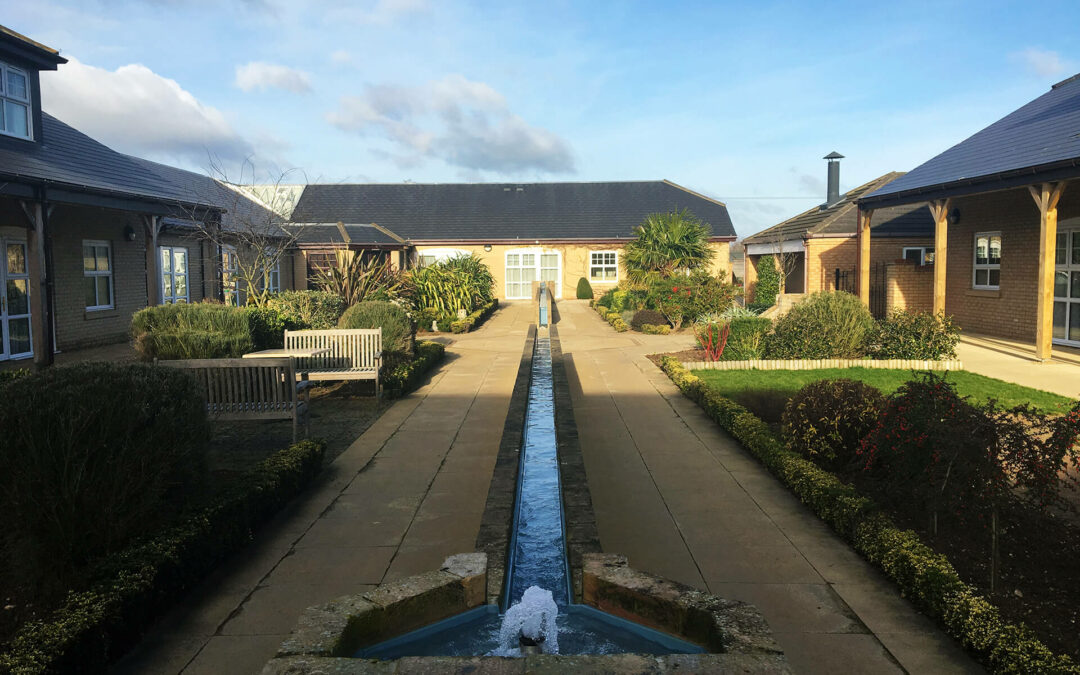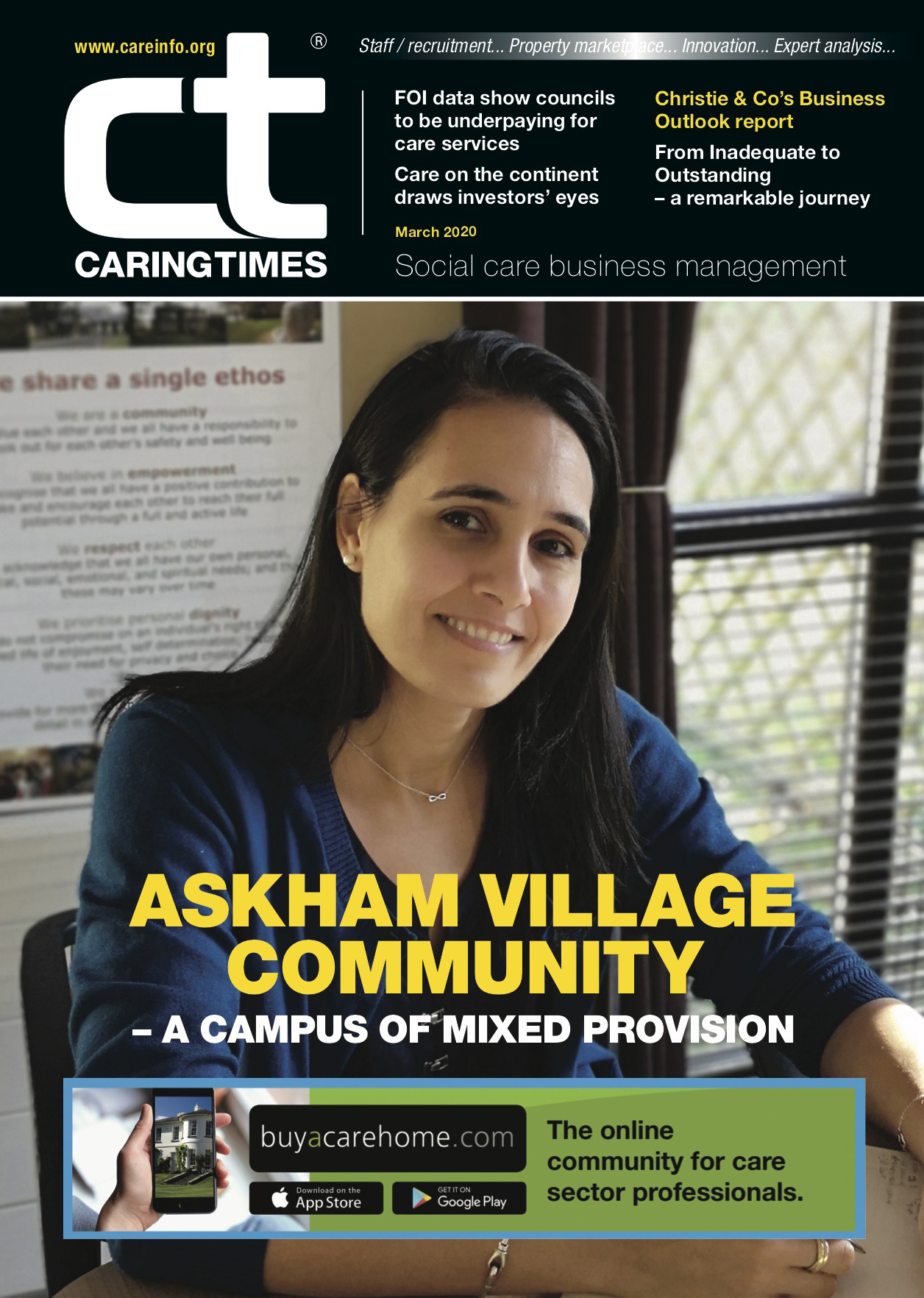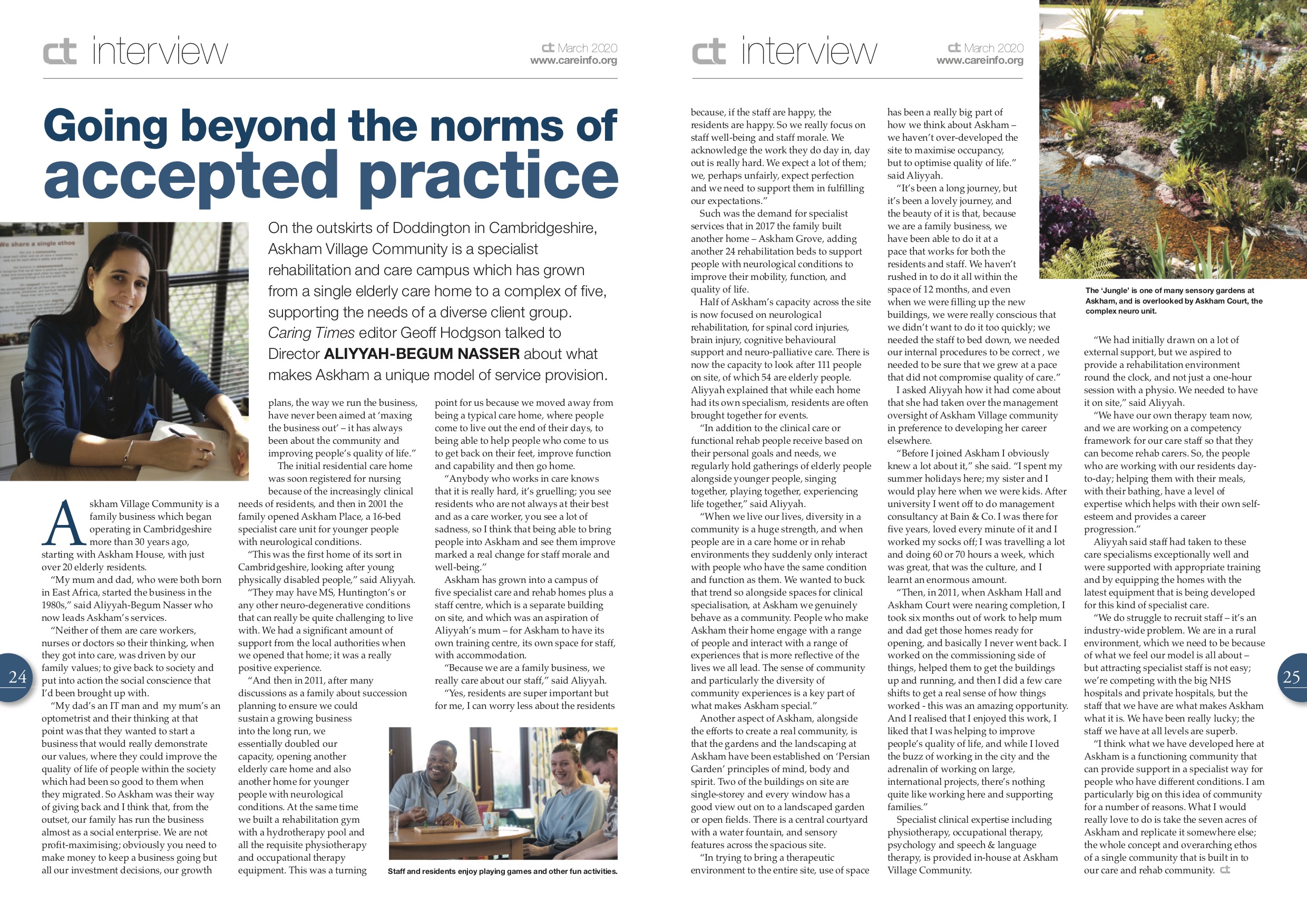On the outskirts of Doddington in Cambridgeshire, Askham Village Community is a specialist rehabilitation and care campus which has grown from a single elderly care home to a complex of five, supporting the needs of a diverse client group. Caring Times editor Geoff Hodgson talked to Director Aliyyah-Begum Nasser about what makes Askham a unique model of service provision.
Askham Village Community is a family business which began operating in Cambridgeshire more than 30 years ago, starting with Askham House, with just over 20 elderly residents.
“My mum and dad, who were both born in East Africa, started the business in the 1980s,” said Aliyyah-Begum Nasser who now leads Askham’s services.”
“Neither of them are care workers, nurses or doctors so their thinking, when they got into care, was driven by our family values; to give back to society and put into action the social conscience that I’d been brought up with.”
“My dad’s an IT man and my mum’s an optometrist and their thinking at that point was that they wanted to start a business that would really demonstrate our values, where they could improve the quality of life of people within the society which had been so good to them when they migrated. So Askham was their way of giving back and I think that, from the outset, our family has run the business almost as a social enterprise. We are not profit-maximising; obviously you need to make money to keep a business going but all our investment decisions, our growth plans, the way we run the business, have never been aimed at ‘maxing the business out’ – it has always been about the community and improving people’s quality of life.”
The initial residential care home was soon registered for nursing because of the increasingly clinical needs of residents, and then in 2001 the family opened Askham Place, a 16-bed specialist care unit for younger people with neurological conditions.
“This was the first home of its sort in Cambridgeshire, looking after young physically disabled people,” said Aliyyah.
“They may have MS, Huntington’s or any other neuro-degenerative conditions that can really be quite challenging to live with. We had a significant amount of support from the local authorities when we opened that home; it was a really positive experience.”
“And then in 2011, after many discussions as a family about succession planning to ensure we could sustain a growing business into the long run, we essentially doubled our capacity, opening another elderly care home and also another home for younger people with neurological conditions. At the same time we built a rehabilitation gym with a hydrotherapy pool and all the requisite physiotherapy and occupational therapy equipment. This was a turning point for us because we moved away from being a typical care home, where people come to live out the end of their days, to being able to help people who come to us to get back on their feet, improve function and capability and then go home.
“Anybody who works in care knows that it is really hard, it’s gruelling; you see residents who are not always at their best and as a care worker, you see a lot of sadness, so I think that being able to bring people into Askham and see them improve marked a real change for staff morale and well-being.”
Askham has grown into a campus of five specialist care and rehab homes plus a staff centre, which is a separate building on site, and which was an aspiration of Aliyyah’s mum – for Askham to have its own training centre, its own space for staff, with accommodation.
“Because we are a family business, we really care about our staff,” said Aliyyah.
“Yes, residents are super important but for me, I can worry less about the residents because, if the staff are happy, the residents are happy. So we really focus on staff well-being and staff morale. We acknowledge the work they do day in, day out is really hard. We expect a lot of them; we, perhaps unfairly, expect perfection and we need to support them in fulfilling our expectations.”
Such was the demand for specialist services that in 2017 the family built another home – Askham Grove, adding another 24 rehabilitation beds to support people with neurological conditions to improve their mobility, function, and quality of life.
Half of Askham’s capacity across the site is now focused on neurological rehabilitation, for spinal cord injuries, brain injury, cognitive behavioural support and neuro-palliative care. There is now the capacity to look after 111 people on site, of which 54 are elderly people. Aliyyah explained that while each home had its own specialism, residents are often brought together for events.
“In addition to the clinical care or functional rehab people receive based on their personal goals and needs, we regularly hold gatherings of elderly people alongside younger people, singing together, playing together, experiencing life together,” said Aliyyah.
“When we live our lives, diversity in a community is a huge strength, and when people are in a care home or in rehab environments they suddenly only interact with people who have the same condition and function as them. We wanted to buck that trend so alongside spaces for clinical specialisation, at Askham we genuinely behave as a community. People who make Askham their home engage with a range of people and interact with a range of experiences that is more reflective of the lives we all lead. The sense of community and particularly the diversity of community experiences is a key part of what makes Askham special.”
Another aspect of Askham, alongside the efforts to create a real community, is that the gardens and the landscaping at Askham have been established on ‘Persian Garden’ principles of mind, body and spirit. Two of the buildings on site are single-storey and every window has a good view out on to a landscaped garden or open fields. There is a central courtyard with a water fountain, and sensory features across the spacious site.
“In trying to bring a therapeutic environment to the entire site, use of space has been a really big part of how we think about Askham – we haven’t over-developed the site to maximise occupancy, but to optimise quality of life,” said Aliyyah.
“It’s been a long journey, but it’s been a lovely journey, and the beauty of it is that, because we are a family business, we have been able to do it at a pace that works for both the residents and staff. We haven’t rushed in to do it all within the space of 12 months, and even when we were filling up the new buildings, we were really conscious that we didn’t want to do it too quickly; we needed the staff to bed down, we needed our internal procedures to be correct, we needed to be sure that we grew at a pace that did not compromise quality of care.”
I asked Aliyyah how it had come about that she had taken over the management oversight of Askham Village community in preference to developing her career elsewhere.
“Before I joined Askham I obviously knew a lot about it,” she said. “I spent my summer holidays here; my sister and I would play here when we were kids. After university I went off to do management consultancy at Bain & Co. I was there for five years, loved every minute of it and I worked my socks off; I was travelling a lot and doing 60 or 70 hours a week, which was great, that was the culture, and I learnt an enormous amount.
“Then, in 2011, when Askham Hall and Askham Court were nearing completion, I took six months out of work to help mum and dad get those homes ready for opening, and basically I never went back. I worked on the commissioning side of things, helped them to get the buildings up and running, and then I did a few care shifts to get a real sense of how things worked – this was an amazing opportunity. And I realised that I enjoyed this work, I liked that I was helping to improve people’s quality of life, and while I loved the buzz of working in the city and the adrenalin of working on large, international projects, there’s nothing quite like working here and supporting families.”
Specialist clinical expertise including physiotherapy, occupational therapy, psychology and speech & language therapy, is provided in-house at Askham Village Community.
“We had initially drawn on a lot of external support, but we aspired to provide a rehabilitation environment round the clock, and not just a one-hour session with a physio. We needed to have it on site,” said Aliyyah.
“So, we have our own therapy team now, and we are working on a competency framework for our care staff so that they can become rehab carers. So, the people who are working with our residents day-to-day, helping them with their meals, with their bathing, have a level of expertise which helps with their own self-esteem and provides a career progression.”
Aliyyah said staff had taken to these are specialisms exceptionally well and were supported with appropriate training and by equipping the homes with the latest equipment that is being developed for this kind of specialist care.
“But honestly speaking, we do struggle to recruit staff – it’s an industry-wide problem. We are in a rural environment, which we need to be because of what we feel our model is all about – but attracting specialist staff is not easy; we’re competing with the big NHS hospitals and private hospitals, but the staff that we have are what makes Askham what it is. We have been really lucky; the staff we have at all levels are superb.
“I think what we have developed here at Askham is a functioning community that can provide support in a specialist way for people who have different conditions. I am particularly big on this idea of community for a number of reasons. What I would really love to do is take the seven acres of Askham and replicate it somewhere else; the whole concept and overarching ethos of a single community that is built in to our care and rehab community.


